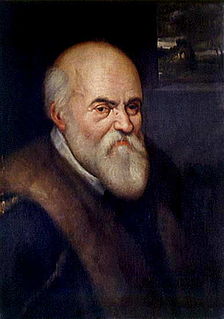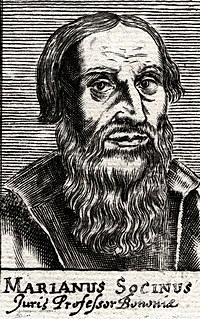
Socinianism is a system of Christian doctrine named for Fausto Sozzini, which was developed among the Polish Brethren in the Minor Reformed Church of Poland during the 16th and 17th centuries and embraced by the Unitarian Church of Transylvania during the same period. It is most famous for its nontrinitarian Christology but contains a number of other unorthodox beliefs as well.
The Polish Brethren were members of the Minor Reformed Church of Poland, a Nontrinitarian Protestant church that existed in Poland from 1565 to 1658. By those on the outside, they were called "Arians" or "Socinians", but themselves preferred simply to be called "Brethren" or "Christians," and, after their expulsion from Poland, "Unitarians".

Pietro Antonio Cataldi was an Italian mathematician. A citizen of Bologna, he taught mathematics and astronomy and also worked on military problems. His work included the development of continued fractions and a method for their representation. He was one of many mathematicians who attempted to prove Euclid's fifth postulate.

Fausto Paolo Sozzini, also known as Faustus Socinus or Faust Socyn (Polish), was an Italian theologian and founder of the school of Christian thought known as Socinianism and the main theologian of the Minor Reformed Church of Poland.

Ulisse Aldrovandi was an Italian naturalist, the moving force behind Bologna's botanical garden, one of the first in Europe. Carl Linnaeus and the comte de Buffon reckoned him the father of natural history studies. He is usually referred to, especially in older literature, as Aldrovandus; his name in Italian is equally given as Aldroandi.
The Racovian Catechism is a nontrinitarian statement of faith from the 16th century. The title Racovian comes from the publishers, the Polish Brethren, who had founded a sizeable town in Raków, Kielce County, where the Racovian Academy and printing press was founded by Jakub Sienieński in 1602.

Valerio Castello born in Genoa, was an Italian painter of the Baroque period and one of the pre-eminent Ligurian painters of his time. His art drew inspiration from a wide range of sources. He painted on canvas and fresco.

Szymon Budny or Symon Budny(Belarusian: Сымон Будны, Polish: Szymon Budny, Russian: Симеон Будный) was a Polish-Belarusian humanist, educator, Hebraist, Bible translator, Protestant reformer, philosopher, sociologist and historian, active in the territory of the Polish-Lithuanian Commonwealth. He was one of the first to promote the development of Belarusian culture in the Belarusian language. He was one of the leaders of the Polish Brethren.
Grzegorz Paweł z Brzezin (1525–1591), was a Socinian (Unitarian) writer and theologian, one of the principal creators and propagators of radical wing of the Polish Brethren, and author of several of the first theological works in Polish, which helped to the development of literary Polish.
Martin Seidelius was a Polish Unitarian.
Paolo Ricci was a Franciscan, then a Lutheran, possibly an Anabaptist, and only allegedly an Antitrinitarian. He also adopted an academic pseudeonym Lisia Fileno, Fileno Lunardi, and finally the name Camillo Renato.
Benedykt Wiszowaty was a Polish Socinian author and publisher.
Celso Sozzini (1517–1570) was an Italian freethinker, brother of Alessandro, Lelio, Cornelio, Dario, and Camillo.
Francesco Pucci was an Italian philosopher and humanist.

Mariano Sozzini il giovane also Socini (1482–1556) was an Italian jurist after whom the cautela sociniana is named. He was descended from Mariano Sozzini the elder (1397–1467) the first of the family of freethinkers.
The Synod of Skrzynno 24 June 1567 was a synod between the Arians and Socinians among the Antitrinitarian Polish Brethren.
The Bibliotheca Fratrum Polonorum quos Unitarios vocant or Library of the Polish Brethren called Unitarians 1668 is a collection of writings of the Polish Brethren published by Frans Kuyper, Daniel Bakkamude, and Benedykt's father Andrzej Wiszowaty Sr. (d.1678) in Amsterdam, with Pieter van der Meersche in Leiden.

Sozzini, Sozini, Socini or Socin is an Italian noble family originally from Siena in Tuscany, where the family were noted as bankers and merchants, jurists and humanist scholars. The family has been described as "the most famous legal dynasty of the Renaissance."







